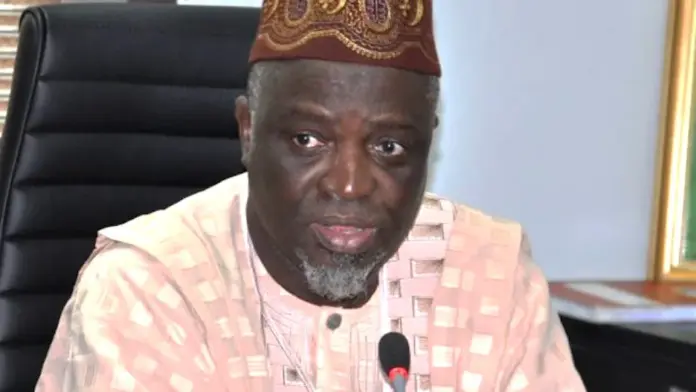The Nigerian Supreme Council for Islamic Affairs (NSCIA) has dismissed claims by former United States President Donald Trump that a “Christian genocide” is taking place in Nigeria, describing such allegations as false, dangerous, and politically motivated.
Speaking at a press briefing in Abuja on Sunday, the National Secretary of the Council, Professor Ishaq Oloyede, said the narrative being promoted by Trump and some far-right Christian groups in the West is aimed at destabilising Nigeria and turning its citizens against one another along religious lines.
He said there is no evidence to support the claim that Nigerian Muslims are persecuting Christians, insisting that both Christians and Muslims have suffered from the same wave of terrorism, criminality, and insecurity across the country.
“There is no Christian genocide in Nigeria. Both Muslims and Christians are victims of terrorists and criminal gangs,” Oloyede stated. “These attackers do not represent Islam. They kill Muslims, destroy mosques, and target everyone without discrimination.”
The Islamic Council was reacting to the earlier decision of the Trump administration to place Nigeria on the “Country of Particular Concern” list — a designation under US law reserved for countries accused of severe violations of religious freedom.
The NSCIA said the move was based on misinformation, exaggerated reports, and a lack of understanding of Nigeria’s complex security situation. According to the council, linking Nigeria’s security crisis to religion is not only misleading but also dangerous for national unity.
Professor Oloyede explained that the insecurity plaguing Nigeria is caused by a combination of factors, including terrorism, banditry, poverty, and the effects of climate change. He said violent groups often compete over scarce resources such as land and water, rather than religious ideology.
“The truth is that terrorists and armed groups exploit social and economic problems to spread fear,” he said. “They have attacked mosques in Zamfara, Borno, and Niger states, and churches in Benue and Plateau. Everyone is a target.”
The NSCIA’s position is supported by independent research from organisations such as Amnesty International, Human Rights Watch, and the International Crisis Group, which have all reported that violence in Nigeria does not fit the legal definition of genocide under international law.
Oloyede suggested that the renewed attempt by Western groups to label Nigeria as a country engaged in religious persecution may be politically motivated. He linked the growing propaganda to Nigeria’s diplomatic position on the Middle East, especially its recent reaffirmation of support for a two-state solution in Palestine at the United Nations.
“The renewed campaign started after Nigeria restated its support for Palestine. Some far-right and pro-Israeli lobbyists are now trying to use religion to punish Nigeria diplomatically,” Oloyede claimed.
He warned that the alleged “Christian genocide” narrative is part of a wider foreign agenda to divide Nigerians along religious lines and destabilise Africa’s most populous nation.
“The agenda is distraction and destabilisation. The fastest way to break Nigeria is to inflame religious tensions,” he said.
The NSCIA urged both Muslims and Christians to reject any external attempts to turn legitimate security challenges into a religious war.
“We must not allow outsiders to define our problems for us. Nigerians know that what we are facing is insecurity, not religious conflict,” he added.
The Council appealed to Nigerians of all faiths to remain united and work together to defeat terrorism and criminality. It urged the US government to withdraw its statement and instead provide Nigeria with intelligence and logistical support to combat insurgency, banditry, and other forms of insecurity.
“We will not allow foreign interests to fragment Nigeria. We stand for unity, peace, and justice,” Oloyede said.
The NSCIA also called on the Nigerian government to intensify efforts to protect citizens across all communities, regardless of religion or ethnicity. It urged security agencies to expose the sponsors of terrorism and banditry, noting that only justice and fairness can bring lasting peace to the country.
“The government must identify and prosecute those funding these violent groups. Nigerians, whether Christian or Muslim, deserve to live in safety,” Oloyede said.
The controversy dates back to 2020, when the Trump administration first designated Nigeria as a “Country of Particular Concern” over alleged violations of religious freedom. Trump had accused the Nigerian government of allowing the killing of Christians in the northern part of the country and threatened sanctions and military action.
The Nigerian government at the time strongly rejected the claim, describing it as “unfounded and unfair.” Officials argued that violence in Nigeria was driven by criminality and terrorism rather than religious persecution.
When President Joe Biden took office, the US State Department removed Nigeria from the list in 2021, saying it found no sufficient evidence to support the earlier classification. However, far-right Christian groups in the US continued to push the claim that Christians were under attack in Nigeria, citing killings by terrorists in the North and Middle Belt.
The NSCIA said these groups have continued to pressure Washington to reinstate the designation, using misleading reports and doctored figures to portray Nigeria as a hostile environment for Christians.
Several Nigerian religious and political leaders have welcomed the NSCIA’s response, saying it was necessary to correct the false international narrative about Nigeria.
The NSCIA’s statement comes at a time when Nigeria is grappling with multiple security challenges — from Boko Haram insurgency in the North-East to banditry in the North-West and farmer-herder clashes in the Middle Belt. Despite these threats, both Muslim and Christian leaders have repeatedly called for peace, tolerance, and collaboration between communities.
Oloyede highlighted that the only way forward is through unity and dialogue. “Nigeria’s strength lies in our diversity,” he said. “We must rise above foreign manipulation and focus on solving our internal problems.”
He also urged the media to act responsibly and verify information before publishing reports that could inflame religious tensions.
“We appeal to journalists to avoid sensational headlines. Peace must be our collective priority,” he concluded.

